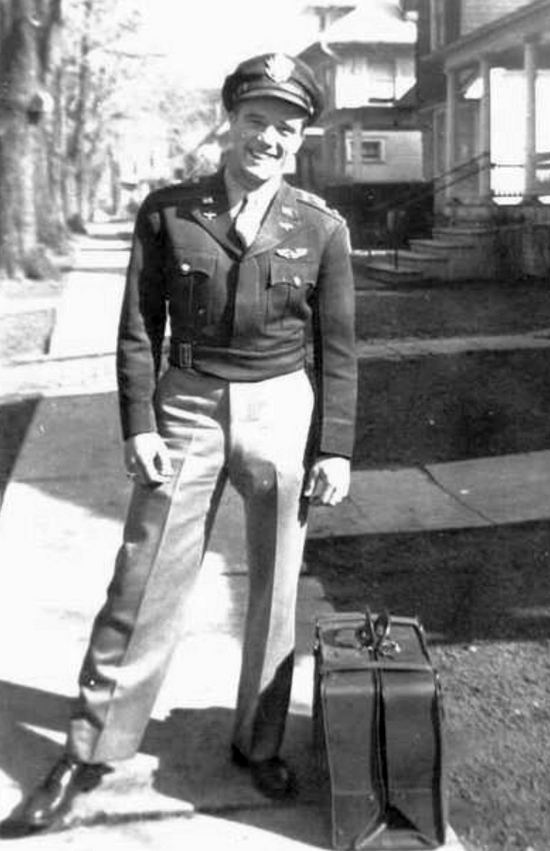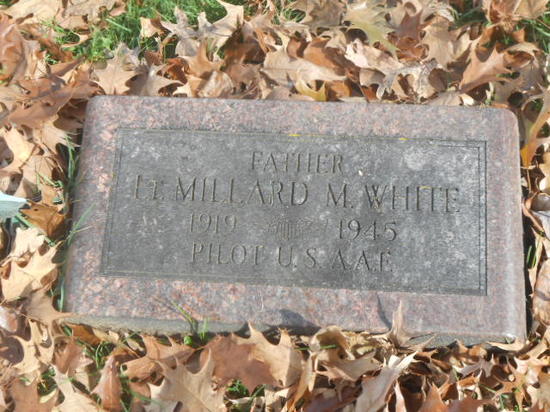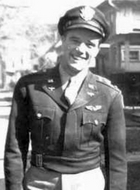Mernie White
| Date and Place of Birth: | December 16, 1919 Fremont, OH |
| Date and Place of Death: | July 3, 1945 near Montoya, NM |
| Baseball Experience: | Minor League |
| Position: | Shortstop |
| Rank: | First Lieutenant |
| Military Unit: | 267th Combat Crew Training Squadron, 2nd Air Force USAAF |
| Area Served: | United States |
Baseball was in his blood. His father had began playing in the northern Ohio industrial leagues at the age of 15, pitched in exhibition games against the Pittsburgh Pirates and Detroit Tigers, and remained closely associated with the game for over 40 years, earning the title, “Mr. Baseball of Fremont.” It was inevitable that his son, Mernie White, would grow up to be a ballplayer.
Millard M. “Mernie” White, the son of Marlin
(better known as “Doc”) and Grace White, was born on December 16, 1919,
in Fremont, Ohio. Fremont is
located along the west bank of the Sandusky River, about 35 miles
southeast of Toledo, and 85 miles west of Cleveland. Mernie was a
natural athlete and excelled at every sport. At Ross High School he
quarterbacked the Little Giants football team and starred on the
basketball squad, while playing shortstop with the Fremont All-Stars.
Mernie graduated from high school in 1938, and went
to work for his father’s plumbing business, White’s Plumbing, which
operated its own baseball team in the amateur Northern Ohio League.
Mernie also joined the Ohio National Guard that year, something that
would unforeseeably shape his future.
In the spring of 1939, it was expected that Mernie
would tryout for the Fremont Green Sox of the Class D Ohio State League.
Fremont had operated a minor league team since 1936 when the Fremont
Reds were formed as a Cincinnati farm team, and Mernie’s father, Dod –
aged 36 – had pitched 14 games for the team with a 3-6 record and 4.79
ERA. By 1939, the club, renamed the Green Sox, was operating as an
independent team in the Ohio State League. However, Mernie decided not
to tryout for the team to preserve his amateur status for a planned
college sports career.
By the spring of 1940, Mernie was working as a
truck driver for a lumber yard in Fremont. What had happened to his
planned college career is unknown, but on May 14, the 20-year-old signed
with the Fremont Green Sox and played his first game against the
Mansfield Braves the following day.
On August 10, 1940, Mernie White played his final
game with the Green Sox, breaking the little finger of his left hand,
but contributing a double and a single in three plate appearances. After
appearing in 85 games and making 324 plate appearances for a .228
batting average, Mernie, with his brother Jack, left the following day
with Company B of the Ohio National Guard for three weeks of army
maneuvers at Camp McCoy in Wisconsin.
Mernie quickly settled into military life. By
January 1941, he was already a platoon sergeant with Company B, 148th
Infantry Regiment of the 37th Infantry Division at Camp
Shelby, Mississippi, but baseball wasn’t far from his mind. By March, he
was organising a 37th Infantry Division team which went on to
win the Camp Shelby championship and Mississippi semi-pro title.
In January 1942, after 16 months of training the 37th
Infantry Division moved to Indiantown Gap, Pennsylvania, to complete its
pre-embarkation training for European service. However, with Japan
sweeping through the Pacific, the 37th Infantry Division was
redeployed to that theater, while Mernie and Jack were selected for
officer training, keeping them in the United States.
They both graduated as second lieutenants from
Officer Candidate School at Fort Benning, Georgia, and received a
nine-day furlough to return home to Fremont. It didn’t take long for
Mernie to return to his baseball flannels. His dad, Dod, had resurrected
the Fremont Green Sox after the Ohio State League had folded as a minor
league circuit following the 1941 season. The league now operated on a
semi-pro basis and on June 28, Mernie played second base for the Green
Sox against Galion. On July 1, he was in the lineup again, this time
against Marion, and the following day, he and Jack left for Fort Meade,
Maryland.
At this time, the brothers applied for transfers to
the Army Air Force. Jack was assigned to an aviation unit at Fort Meade,
while Mernie was retained by the infantry and returned to Camp McCoy,
where he served as a company commander with the 76th Infantry
Division. In August 1942, Mernie returned to Fremont on a short furlough
to marry Jeanne Freeh at St. Joseph’s Church.
Mernie was Fort Meade, when he was promoted to
first lieutenant, and his request to join the Army Air Force was
approved. His aviation training as a fighter pilot began at Napier
Field, Alabama.
In June 1943, Mernie and Jeanne’s son, Marlin,
better known as Bucky, was born, and Mernie was back in Fremont playing
shortstop for the Green Sox in an exhibition game against the Negro
League Cleveland Buckeyes. Batting in the number two slot, the
23-year-old went 1-for-4 in the 7-5 loss to the Buckeyes.
In December 1944, Mernie returned home on a 10-day
furlough to be with his wife, son and brother, Jack, who had returned
from active duty in Italy. Jack, a B-24 bomber pilot, had flown 31
combat missions. It was at this time that Mernie and his brother-in-law,
Jim Freeh, a veteran bomber pilot, hired small planes from nearby Tiffin
airport and buzzed the people of Fremont.
Mernie was a fighter pilot by 1945, and his wife
and child were living with him at Strother Field in Kansas, where he
played baseball with the Strother Field Fliers.
On July 2, 1945, Mernie was transferred to Fort
Sumner Army Air Base in New Mexico, for gunnery training with the 267th
Combat Crew Training Squadron of the Second Air Force. Jeanne and Bucky
had to return to Fremont as it had proved impossible for them to obtain
living quarters at Fort Sumner.
The following day, July 3, 1945, First Lieutenant
Millard “Mernie” White was flying a P-47D Thunderbolt on a routine
exercise from Fort Sumner, when he developed engine trouble about 100
miles north of the base. Mernie was able to bring the fighter plane down
safely near Montoya, New Mexico, but as he was taxiing the engine
exploded, killing the 25-year-old. Mernie had been in service for almost
five years. Two months later the war would be over.
Jeanne had only been back in Fremont for 12 hours
when she received the devastating news by telegram. Mernie’s body was
returned home on July 9, and laid to rest at Oakwood Cemetery, following
a military service at Hayes Memorial Methodist Church.
Mernie’s brother, Jack, attained the rank of
Lieutenant-Colonel in the Army Air Force and was awarded the
Distinguished Flying Cross for his combat flying in Italy. He passed
away, aged 79, in 1997. His father, Dod, continued to play baseball and
didn’t hang up his spikes until he was 56 years old. He passed away,
aged 85, in 1985.
|
Year |
Team |
League |
Class |
G |
AB |
R |
H |
2B |
3B |
HR |
RBI |
AVG |
|
1940 |
Fremont |
Ohio State |
D |
85 | 324 | - | 74 | 9 | 1 | 0 | - | .228 |


Date Added March 21, 2020
Baseball's Greatest Sacrifice is associated with Baseball Almanac
Baseball's Greatest Sacrifice is proud to be sponsored by

